- Home
- Jack Canfield
Chicken Soup for the Soul Christmas Page 10
Chicken Soup for the Soul Christmas Read online
Page 10
“It’s too expensive,” Tim said. “The euro is strong; the dollar is weak. We’ve already overspent.”
“But,” I protested, “this may be the chance of a lifetime.
Besides, isn’t your Uncle James buried somewhere in France?”
“I’m not sure. Mom never talks about it.”
I was positive he wanted to go. Tomorrow might be our only chance ever. So I pressed.
“We should do the tour, Hon, even if it means charging it on our American Express card. It’s something we’ll never have the opportunity to do again.”
It was a lot of money in euros; I didn’t even want to know the equivalent in dollars. I repeated my mantra with the clincher.
“Let’s do it. When will we ever be this close again? It’s my Christmas gift to you.”
The wake-up call came at 5:30 AM. We sipped coffee in silence and met our guide in the lobby. By 6:15 we were winding our way northward to Normandy Beach. The biting wind had picked up as we reached La Pointe du Hoc, a monument erected halfway between Omaha and Utah beaches. I buttoned my coat, wound my scarf tightly, and wished I had worn earmuffs and boots as we emerged from the minivan.
The gun battery and concrete bunkers top the bluffs that open onto the sea, with a gray setting of sky, bunkers, and gun turrets. In 1944, the ranger objective was to scale the one-hundred-foot cliff and defeat the German army.
Two hundred and twenty-five rangers accomplished the mission but amassed heavy casualties.
Omaha Beach possessed an eerie stillness, a feeling that many spirits still guarded the shoreline. Tim and I slogged through mud to the bluff’s crest to view the harbor still laden with sunken vessels that provided a land bridge for the Allied forces. At the Caen Museum, an interactive media explained further World War II battles and the European campaign.
The afternoon schedule rounded out our tour with the Normandy Cemetery at St. Laurent-sur-Mer, 170 miles from Paris. While our companions visited the Memorial Gardens, Tim and I headed to the Visitors’ Center. Since we were the sole visitors, Tim asked the hostess how to locate a family member buried in one of the French military cemeteries. She plugged the vital statistics into her database and summarily disappeared. Seconds later, she reappeared wearing a trench coat and carrying a tray. She asked if we would like to visit the gravesite. Stunned by her remark, Tim nodded, and I followed. Still a bit shaken, we climbed into the vinyl-swathed golf cart. Our hostess drove to Plot H, Row 11, Grave Number 19. She smoothed a clay substance over the recessed letters on the white marble cross; the name and dates popped out. She snapped several Polaroids: date of death, eleven days after D-Day. I couldn’t look at Tim. My eyes were glistening. The surreal feeling of actually being at Normandy Beach and viewing the gravesite of PFC James E. Lee was penetrating me. Tim’s Uncle James was someone I had heard about for more than thirty-five years, and here was his final resting place.
Our hostess gave us the option of returning to the Center or remaining at the gravesite. More emotionally overwhelmed than we had bargained for, Tim thanked her and said we’d stay. A sympathetic smile said she had seen our reactions before—finite minds struggling to grasp our discovery, drink in the reality of lives lost, and experience the tremendous grief of this place. No words came, only tears burning our cheeks. A large lump wedged itself in my throat, so I didn’t speak. My heart was full for mothers like Mama Lee, who had lost a son on foreign soil, and for young, courageous soldiers like the nineteen-year-old from west Georgia who had left his home and family, including his twelve-year-old sister (now my mother-in-law), to serve his country even if it meant his life.
Uncle James rests with his comrades-in-arms under a bronze statue depicting the “Spirit of American Youth Rising from the Waves.” Plot H faces the reflection pool and circular chapel. Like Pearl Harbor, this consecrated ground yields a deafening silence louder than the rushing winds and lapping waves. The chapel carillon began to play a military anthem. It was time to start back.
We took one last look at the white cross bearing James Lee’s name, rank, date of birth and death, and one last photo. Tim reverently touched the marker, memorizing this moment.
“I’d give anything if Mom and Dad could see this,” he said. I nodded.
The marker was one of thousands, each a simple reminder of a single life given for a cause. A glance in any direction showed row upon row of identical crosses and Jewish stars dotting the evergreen lawn—nine thousand in this cemetery alone.
I felt a rush of emotion at this realization, and I wiped my nose. We clasped hands and silently strolled among the trees bent double by the wind. A strange mingling of thankfulness and grief filled me as we returned to the minivan.
On the return trip, Tim and I didn’t say anything for a while. It was one of those moments that people who have been married a long time understand. We didn’t need words to express ourselves. Finally, my husband of thirty five years looked at me with shining eyes.
“It was worth it,” he whispered, “every penny.”
“Think not upon their passing. Remember the glory of their spirit.” My thoughts exactly as we pay silent homage to the thousands of Uncle Jameses who guaranteed our freedom.
I gave my husband the Normandy trip for a Christmas gift, but I received more than I could ever give. The gift of Normandy Beach was one that I will remember the rest of my life.
Sheila S. Hudson
Caroling with the Coots
A few years ago, my husband, Bud, started a harmonica band, the Harmonicoots, for residents of Sun City—a retirement community for people fifty-five and over—in Roseville, California, where we live. Within months, the band, more than sixty men and women strong, got good enough to perform seventy gigs in public at various venues and events.
Last year, the Coots, as they are affectionately known, decided to go Christmas caroling in our community, organizing three gigs per night for three consecutive nights in December. Their aim was to go to the homes of shut-ins and disabled people, play and sing Christmas carols for about a half-hour, and then move on to the next house.
That first night, as he was getting ready to go, Bud asked me if I wanted to join them.
“I’d feel like a fifth wheel,” I told him. “How on Earth can a person who doesn’t play the harmonica, can’t sing worth a lick, and would only be in the way, contribute to caroling?”
“Just your presence would be enough,” he said.
“Yeah, right,” I retorted.
I thought about it long and hard. I would love to go caroling with the Coots, but there were so many reasons to stay home. The only musical instrument I’d ever played was the guitar, which I hadn’t picked up in forty years.
Then there was my voice. I remember my college chorus teacher asking another singer and me not to sing, just to mouth the words during a performance. Worse, cold weather really bothers me. I shake uncontrollably, and my teeth chatter. When my ears get too cold, I get a pounding headache. If I joined the Coots for caroling, one of two things would happen: they’d suffer, or I’d suffer.
But then, I thought, I’d miss out on all the fun and camaraderie. And where was my Christmas spirit? The yuletide season was made for sharing and caring and bringing joy to one another, right? If I stayed home, I’d be another Scrooge, “bah-humbugging” all night. I decided to follow my heart instead of my head. I decided to go.
First, I put on Bud’s long johns under my slacks, added layers of sweaters and socks, found some cashmere-lined gloves, and donned the thickest ear muffs I could find.
That took care of the cold. As for my voice, I had no problem not singing. That was a blessing even to me. But how could I fully participate in a musical event with nothing to play? I resigned myself to either hiding in the background, silently observing the festivities, or waiting in the car to chauffeur a few people to the next stop. Either way, it looked like it was going to be a long night. Oh, well, I thought, at least I won’t freeze.
Just as we were bun
dling up in coats and Santa hats, I noticed the large jingle-bell wreath I had hung on the inside our front door. At the last minute, I grabbed it and hid it in the back seat. When we got inside the first house, I pulled the wreath out from under my coat. Bud looked at me in amazement, but I shrugged and said, “I have to play something!” When some thirty Coots began to play and sing “Jingle Bells,” what a difference those bells made!
Everyone was smiling and looking my way, happy that I’d found a way to add to the merriment of the evening.
That magical night, at our first house, we played for an elderly couple who had been ill for months. As we spilled into their living room, I noticed the husband hooked up to an oxygen tank, while his frail wife suffered from severe arthritis. She clapped to the music with gnarled hands, while he tapped his fingers on his armchair. Later, he told us, “Thank you. This is the best Christmas we’ve had in years.”
The second house was just as memorable. Two of the Coots, Elmer and Jeannie, professional singers in a local band, brought smiles of awe and wonder to the neighbors with their harmonized version of “Silent Night.” One sweet lady, her hands leaning on a walker, was so moved by the music that she had tears streaming down her face.
Our visit to the third house brought tears to our eyes. We went to the home of Rosemary Erkel, whose daughter told us it was the first time her mother had been out of bed in a year. Her face peaceful and glowing as if from an inner fire, Rosemary, dressed in a bright red outfit and warm slippers, sat in her wheelchair in her living room as the Coots played and sang to her and her family. At times she’d sing along with us; other times she’d close her eyes to savor the moment as if it were a feast she was enjoying one bite at a time. This was her last Christmas with us— Rosemary died soon afterward.
Now, as I glance over the upcoming schedule of caroling, I can’t wait to accompany the Coots again, slapping those bells against my palm to “Jingle Bells,” “Deck the Halls,” and other joyful songs, hoping to brighten the holidays for our neighbors and friends. I no longer worry about making a contribution. Instead, I feel gratified by the gifts I receive just by taking part. My spirit soars to the internal rhythm of love and compassion, which reaches out to all those lonely souls whose homes we visit. My heart sings, even though my voice can’t. Best of all, remembering the childlike delight on all those radiant faces keeps me warm the whole year long. Caroling with the Coots, once a dreaded event, has become my favorite Christmas gift to myself.
Jennifer Martin
Cass Park Church’s carolers were always ready to make necessary adjustments.
Reprinted by permission of Jonny Hawkins. © 2007 Jonny Hawkins.
Bearing Gifts
The greatest good you can do for another is not just share your riches, but to reveal to him his own.
Benjamin Disraeli
Christmas with my brother, Ken, was always a magical time. He never got “too cool” for excitement over the holidays the way the rest of us did. Ken was born smack in the middle of my parents’ twelve kids. He was born a month early in an era when pediatric intensive care units weren’t what they are today. Halfway through the delivery, the doctors realized the umbilical cord was wrapped around Ken’s throat, cutting off the oxygen to his brain. By the time he was in the doctor’s arms, it had been cut off long enough to leave him with cerebral palsy, mild retardation, and profound deafness. But God is good, and he formymore than compensated for Ken’s handicaps by lavishing on him a sparkling personality, a zest for life, and a childlike faith that worked like a magnet to attract everyone around him.
Because my brother, Mark, was born less than a year after Ken, and my sister, Gail, had been born ten months earlier, babying Ken was not an option. He was part of the gang from day one, and although he didn’t walk until he was twelve, he never had trouble keeping up with the rest of us, or the passel of neighborhood kids and cousins who hung around our house.
In the hospital, the doctors had advised my parents not to even see Ken, to place him in a special home and forget they’d had him. They predicted he’d never walk or talk, never feed himself, and wouldn’t live past his tenth birthday. Ken was seven by the time I was born, and I’m glad the doctors never told him any of that. The Ken I knew was lean and taut, feisty and impish, and ate anything that didn’t eat him first. He loved a party, loved being the center of attention, and loved everything to do with Christmas.
One of my favorite Christmas memories was a year when our grandparents sent us a new swing set. From first glance, Ken was fascinated with the slide. He spent the holidays on the ground offering a blow-by-blow commentary as the rest of us slid down. He’d squeal with delight as we began to slide, throw his head back and laugh when we landed with a splat at his feet, then chase us on all fours, trying to grab us and tickle us before we could crawl back up the ladder and out of reach. He never tried to traverse the ladder himself, though. His scrawny, twisted legs just didn’t work that way.
The day the rest of us started back to school, Mama knew what she had to do. She bundled up Ken, took him out to the backyard, pointed him toward the ladder, and began to pray. “Okay, Lord, Ken wants to go down the slide. I’m gonna need all the help I can get to let him try.”
Years later, she told me how hard it was watching him climb and fall, climb and fall, again and again. He tore both knees out of his pants, cut one elbow, and bloodied his forehead. One particularly bad tumble left him rocking on the lawn, crying and holding a knot on the back of his head.
The neighbor to the back of us came to the fence and yelled at my mama, “What kind of woman are you? Get that baby off that ladder!” Mama told her as nicely as she could that, if it bothered her, she’d have to close her curtains and stop watching. Ken had decided he was going down the slide, and down the slide he would go, no matter how long it took him.
By the time the rest of us got home from school, Ken was black and blue, but smiling from ear to ear. Not only could he get up and down the slide with lightning speed, but heaven help the kid who got in his way.
That was a generous gift my grandparents sent us that year. I’m sure it set them back a bit. But the real gift came from my mom, my mom who loved my brother enough to watch him struggle, and to pray for the courage not to interfere, knowing how important it was for Ken to do things on his own.
That was almost fifty years ago. I wish I knew where those doctors are now. They were so ready to tell us all my brother would never do. Obviously, they didn’t know the God we knew. What would they say if they could see Ken now at age fifty-five, living independently and holding down a job? They didn’t know back then that God had a much bigger plan for my brother, and they didn’t know the mama who loved him enough and trusted God enough to give him the best Christmas present he’d ever receive.
Mimi Greenwood Knight
5
CHRISTMAS
TRADITIONS
Heap on the wood!
The wind is chill;
But let it whistle as it will.
We’ll keep our Christmas merry still.
Sir Walter Scott
Holiday Tale
Even as an adult, I find it difficult to sleep on Christmas Eve.Yuletide excitement is a potent caffeine, no matter your age.
Carrie Latet
Like many other people, this time of year is my favorite. People really get into the true reason for the holidays: miracles, good cheer, helping your fellow man. However, others, like me as a seven-year-old boy, only thought of one thing: presents!
Every year the holidays would come, and while my friends had millions of gifts under their trees (and in their living room for my Jewish friends), I would only get one gift. My parents would always say that we could not afford anything else. Besides, that was not the true meaning for the holidays! (As a child, I got sick and tired of that excuse.)
One year when I was eleven, I was more happy and excited than usual during the holidays. Was it because there was world peace? No. Was it because
there was less hunger in Africa? No. Or even perhaps there was a cure for a terrible disease? Not even that. It was because I saw two gifts for me! What in the world could they be? Sure, I had been extra good during the year, but what in the world did I do to deserve two gifts? I really did not care. I was just so excited not to have only one gift that year.
My parents, as well as my other siblings, had gathered together. After we’d said some prayers and sung some songs, we were going to open the gifts. Anticipation was getting to me. My heart was racing. Finally, I was allowed to rip through the first wrapped package. My joy quickly turned to depression when I realized what the first gift contained: a left sock! (I’m sure you can guess what my second present would be: the right sock.)
Years later, as I’ve matured, I’m not so sure if that story is true or if I’ve just told it so many times that I think it’s true. It really doesn’t matter. I’ve learned that what does matter is the holiday spirit: helping others, being appreciative, and showing kindness and love. But before I take too much time in writing about the holidays, I better make sure I get down to the department store to buy my daughter a holiday present: a pair of socks. One can never forget a great ritual!
Michael Segal
The World’s Biggest Table
Christmas is sights, especially
the sights of Christmas reflected in
the eyes of a child.
William Saroyan
It was the biggest table in the world, and it was filled with brightly wrapped Christmas presents. The gifts were piled so high they formed a peak in the middle of the table. This was truly a miracle to the eyes of a child. How did they get there? Who were they for? Was it possible that one or maybe two were for me?

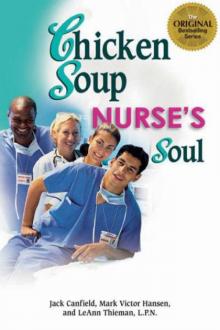 Chicken Soup for the Nurse's Soul: Second Dose
Chicken Soup for the Nurse's Soul: Second Dose Chicken Soup for the Ocean Lover's Soul
Chicken Soup for the Ocean Lover's Soul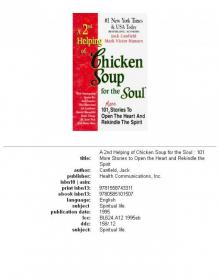 A 2nd Helping of Chicken Soup for the Soul
A 2nd Helping of Chicken Soup for the Soul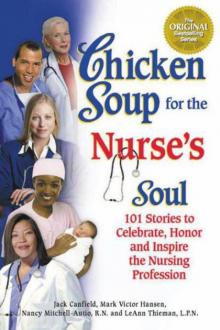 Chicken Soup for the Nurse's Soul
Chicken Soup for the Nurse's Soul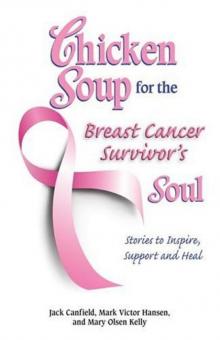 Chicken Soup for the Breast Cancer Survivor's Soul
Chicken Soup for the Breast Cancer Survivor's Soul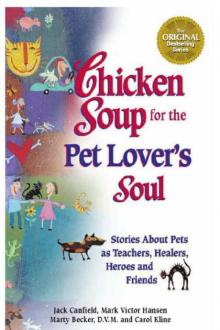 Chicken Soup for the Pet Lover's Soul
Chicken Soup for the Pet Lover's Soul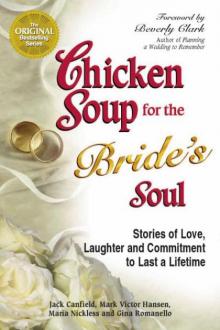 Chicken Soup for the Bride's Soul
Chicken Soup for the Bride's Soul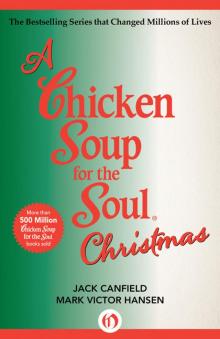 A Chicken Soup for the Soul Christmas
A Chicken Soup for the Soul Christmas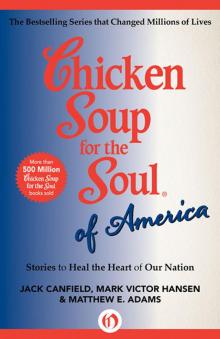 Chicken Soup for the Soul of America
Chicken Soup for the Soul of America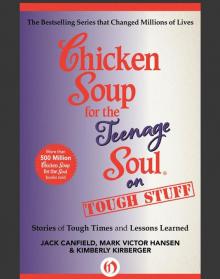 Chicken Soup for the Teenage Soul on Tough Stuff
Chicken Soup for the Teenage Soul on Tough Stuff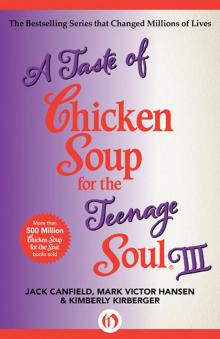 A Taste of Chicken Soup for the Teenage Soul III
A Taste of Chicken Soup for the Teenage Soul III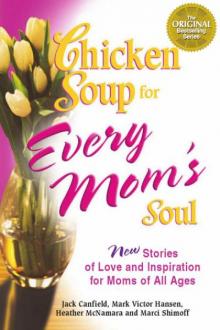 Chicken Soup for Every Mom's Soul
Chicken Soup for Every Mom's Soul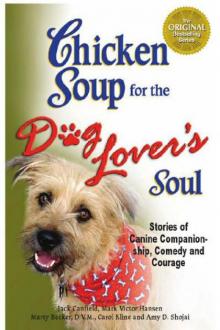 Chicken Soup for the Dog Lover's Soul
Chicken Soup for the Dog Lover's Soul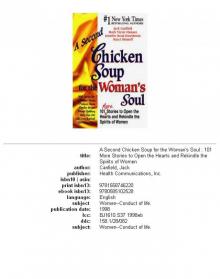 A Second Chicken Soup for the Woman's Soul
A Second Chicken Soup for the Woman's Soul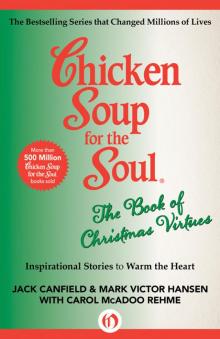 Chicken Soup for the Soul the Book of Christmas Virtues
Chicken Soup for the Soul the Book of Christmas Virtues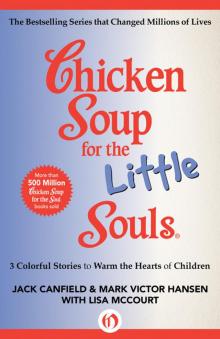 Chicken Soup for the Little Souls: 3 Colorful Stories to Warm the Hearts of Children
Chicken Soup for the Little Souls: 3 Colorful Stories to Warm the Hearts of Children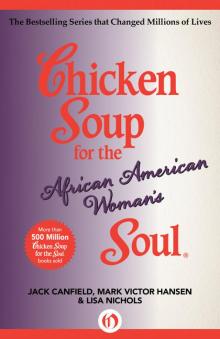 Chicken Soup for the African American Woman's Soul
Chicken Soup for the African American Woman's Soul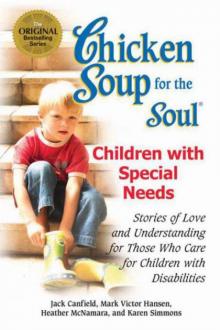 Chicken Soup for the Soul
Chicken Soup for the Soul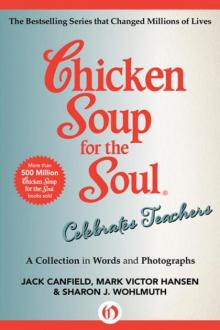 Chicken Soup for the Soul Celebrates Teachers
Chicken Soup for the Soul Celebrates Teachers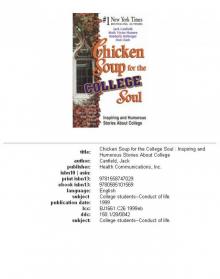 Chicken Soup for the College Soul
Chicken Soup for the College Soul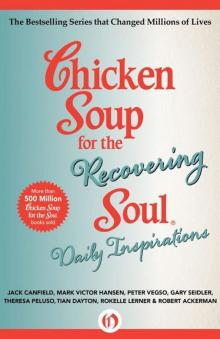 Chicken Soup for the Recovering Soul Daily Inspirations
Chicken Soup for the Recovering Soul Daily Inspirations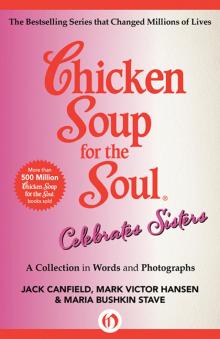 Chicken Soup for the Soul Celebrates Sisters
Chicken Soup for the Soul Celebrates Sisters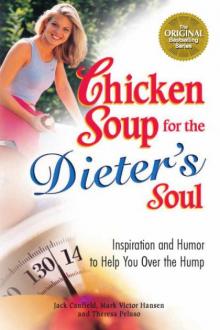 Chicken Soup for the Dieter's Soul
Chicken Soup for the Dieter's Soul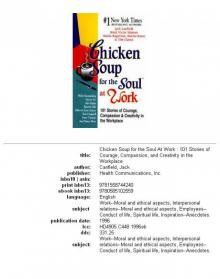 Chicken Soup for the Soul at Work 101 Stories of Courage
Chicken Soup for the Soul at Work 101 Stories of Courage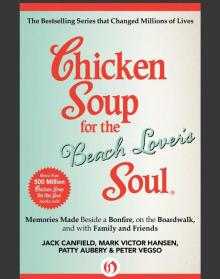 Chicken Soup for the Beach Lover's Soul
Chicken Soup for the Beach Lover's Soul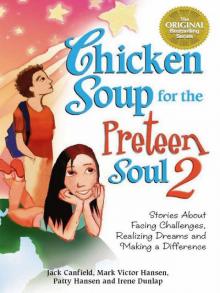 Stories About Facing Challenges, Realizing Dreams and Making a Difference
Stories About Facing Challenges, Realizing Dreams and Making a Difference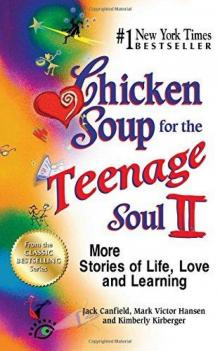 Chicken Soup for the Teenage Soul II
Chicken Soup for the Teenage Soul II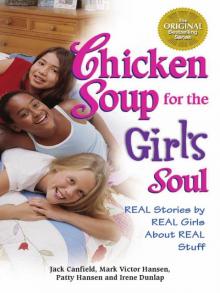 Chicken Soup for the Girl's Soul
Chicken Soup for the Girl's Soul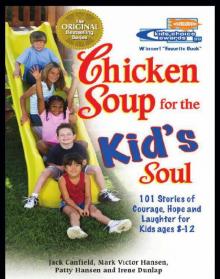 Chicken Soup for the Kid's Soul: 101 Stories of Courage, Hope and Laughter
Chicken Soup for the Kid's Soul: 101 Stories of Courage, Hope and Laughter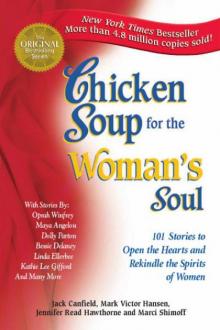 Chicken Soup for the Woman's Soul
Chicken Soup for the Woman's Soul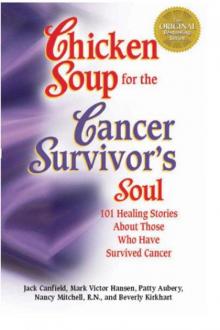 Chicken Soup for the Cancer Survivor's Soul
Chicken Soup for the Cancer Survivor's Soul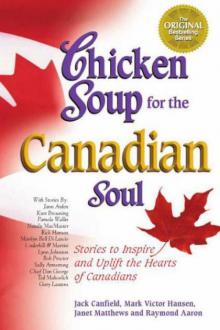 Chicken Soup for the Canadian Soul
Chicken Soup for the Canadian Soul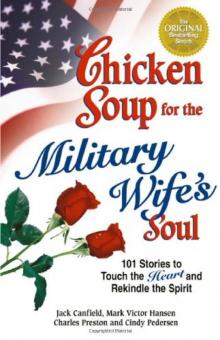 Chicken Soup for the Military Wife's Soul
Chicken Soup for the Military Wife's Soul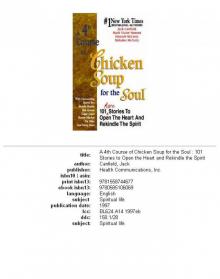 A 4th Course of Chicken Soup for the Soul
A 4th Course of Chicken Soup for the Soul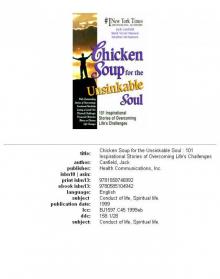 Chicken Soup Unsinkable Soul
Chicken Soup Unsinkable Soul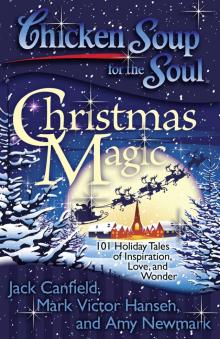 Chicken Soup for the Soul: Christmas Magic
Chicken Soup for the Soul: Christmas Magic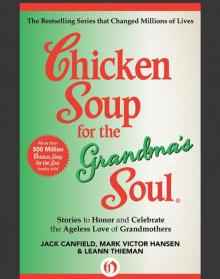 Chicken Soup for the Grandma's Soul
Chicken Soup for the Grandma's Soul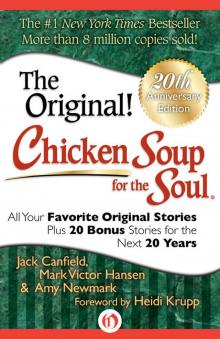 Chicken Soup for the Soul: All Your Favorite Original Stories
Chicken Soup for the Soul: All Your Favorite Original Stories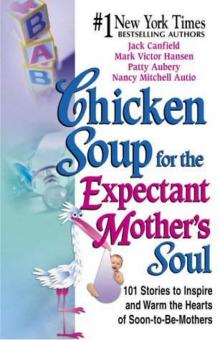 Chicken Soup for the Expectant Mother's Soul
Chicken Soup for the Expectant Mother's Soul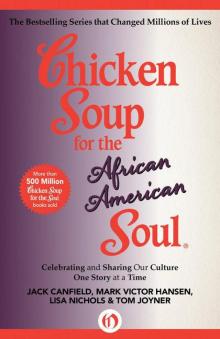 Chicken Soup for the African American Soul
Chicken Soup for the African American Soul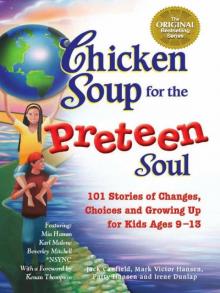 101 Stories of Changes, Choices and Growing Up for Kids Ages 9-13
101 Stories of Changes, Choices and Growing Up for Kids Ages 9-13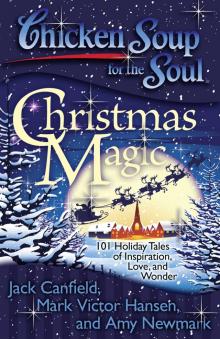 Christmas Magic
Christmas Magic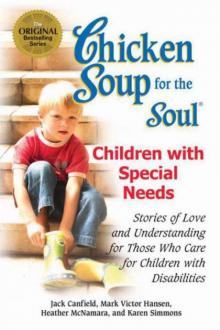 Chicken Soup for the Soul: Children with Special Needs
Chicken Soup for the Soul: Children with Special Needs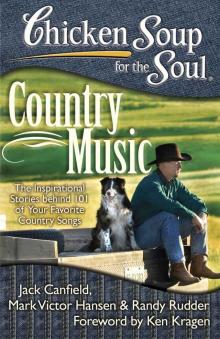 Chicken Soup for the Soul: Country Music: The Inspirational Stories behind 101 of Your Favorite Country Songs
Chicken Soup for the Soul: Country Music: The Inspirational Stories behind 101 of Your Favorite Country Songs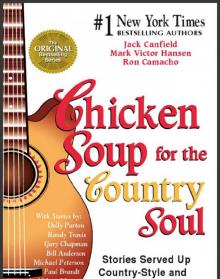 Chicken Soup for the Country Soul
Chicken Soup for the Country Soul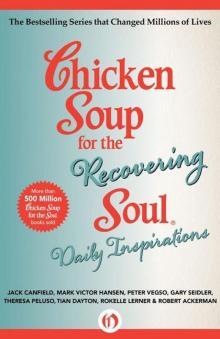 Chicken Soup for the Recovering Soul Daily Inspirations (Chicken Soup for the Soul)
Chicken Soup for the Recovering Soul Daily Inspirations (Chicken Soup for the Soul)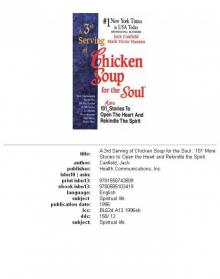 A 3rd Serving of Chicken Soup for the Soul
A 3rd Serving of Chicken Soup for the Soul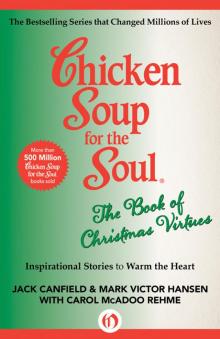 The Book of Christmas Virtues
The Book of Christmas Virtues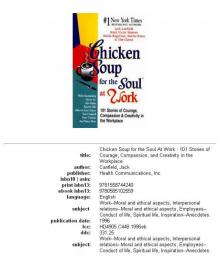 Chicken Soup for the Soul at Work
Chicken Soup for the Soul at Work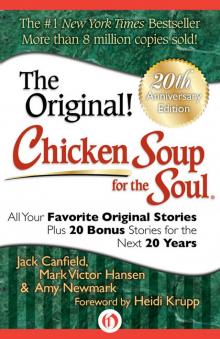 Chicken Soup for the Soul 20th Anniversary Edition
Chicken Soup for the Soul 20th Anniversary Edition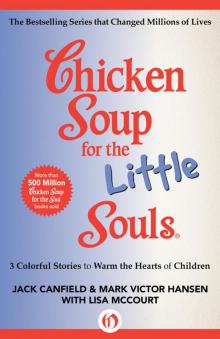 Chicken Soup for the Little Souls
Chicken Soup for the Little Souls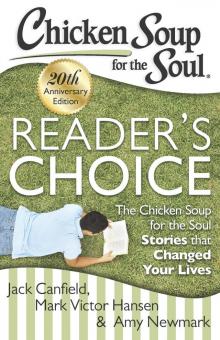 Chicken Soup for the Soul: Reader's Choice 20th Anniversary Edition
Chicken Soup for the Soul: Reader's Choice 20th Anniversary Edition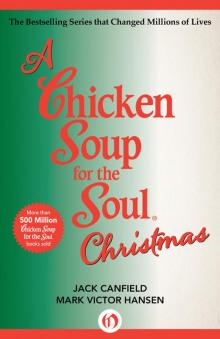 Chicken Soup for the Soul Christmas
Chicken Soup for the Soul Christmas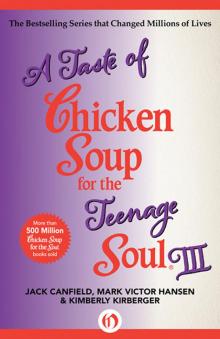 Taste of Chicken Soup for the Teenage Soul III
Taste of Chicken Soup for the Teenage Soul III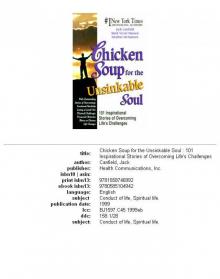 Chicken Soup for the Unsinkable Soul
Chicken Soup for the Unsinkable Soul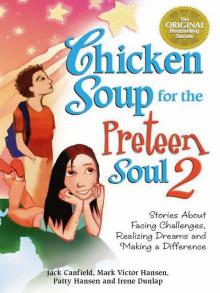 Chicken Soup for the Preteen Soul II
Chicken Soup for the Preteen Soul II